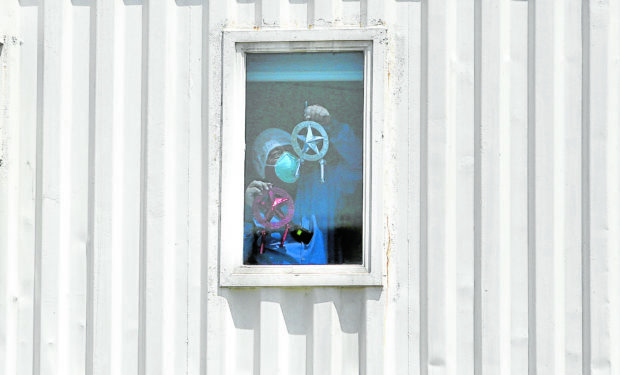Hospital bed occupancy down to ‘safe levels’– DOH

THEY COME IN PAIRS. This medical worker finds cheer in hanging Christmas “parol” by the window of the Manila COVID-19 Field Hospital in the capital. MARIANNE BERMUDEZ
MANILA, Philippines — Hospital bed occupancy for COVID-19 patients has gone down to “safe” levels nationwide and in Metro Manila, according to data from the Department of Health (DOH).
According to the agency’s COVID-19 tracker, healthcare usage nationwide has eased to 57 percent, which is considered safe, from a moderate risk of 64 percent a week ago. In Metro Manila, it has declined to 51 percent from 61 percent.
The occupancy for COVID-19 intensive care unit (ICU) beds across the country has likewise improved to 70.39 percent, which borders the moderate risk levels, from a high risk of 73 percent a week ago.
In Metro Manila, 66.84 percent of ICU beds for COVID-19 patients are occupied, down from 74 percent a week ago.
Hospital bed occupancy, however, remained at high risk in four of the five regions flagged by the DOH last week.
Article continues after this advertisementThese are the Cordillera Administrative Region, whose COVID-19 hospital beds and ICU beds are 88 percent and 85 percent occupied; Cagayan Valley, at 81 percent and 94 percent; the Zamboanga Peninsula, at 72 percent and 79 percent, and Bicol, 69 percent and 89 percent.
Article continues after this advertisementLower alert level
Presidential Adviser on Entrepreneurship Joey Concepcion has urged the government to consider putting the National Capital Region (NCR) under a lower alert level following the downward trend in COVID-19 cases.
Based on OCTA Research’s recent report, the seven-day average daily number of cases declined by 32 percent while the reproduction rate—or the number of individuals an infected person can transmit the virus to—eased to 0.67 percent from the previous week’s 0.88 percent.
“It’s now time for the government to look closely at the numbers and believe the global data of cases going down like in Thailand and Malaysia. We can downgrade to alert level 2 or alert level 3 with 50-percent capacity and reopen the cinema and wellness industry,” Concepcion said.
The DOH on Sunday night reported 12,159 new COVID-19 cases and 119 more deaths. This brought the country’s total cases to 2,666,562 and deaths to 39,624. Total recoveries stood at 95.1 percent. Metro Manila is currently under alert level 4 until Oct. 15. Certain economic activities such as dining in are allowed at very limited capacities.
Dr. Guido David of OCTA Research in an interview with dzMM on Sunday said that by the end of the month, NCR might be classified as low risk based on their criteria.
“We are not seeing any threatening variant of concern that can enter our country as of now so I think the trend will continue until Christmas,” David said.
Concepcion is also pushing to increase the capacity of indoor establishments under alert level 3 to operate up to 50 percent to allow employment and livelihood opportunities as the holiday season approaches.
According to the existing guidelines of the Inter-Agency Task Force for the Management of Emerging Infectious Diseases (IATF), alert level 3 allows businesses to operate only at 30-percent capacity.
Increased capacity
Concepcion said this would not be enough to cover the businesses’ expenses, employee salaries, and 13th-month pay.
“They need more to recover. Let’s allow more fully vaccinated individuals to help our business sector as the cases go down,” he said.
The Go Negosyo founder is also calling for the reopening of cinemas, skin clinics, and wellness spas for the fully vaccinated across alert levels. The IATF rules allow these establishments to open only if they are classified under alert level 2.
“With their commitment toward keeping their venues safe, we should at least allow them to reopen gradually. Our cinemas are used as vaccination centers, meaning they are safe,” Concepcion said.
He added that the last quarter of the year is crucial for businesses as it provides opportunities to recover some losses. “Let’s give our businesses a fighting chance,” he said.
Fr. Nicanor Austriaco, OCTA Research fellow and molecular biologist-priest, said Metro Manila was undergoing a deceleration phase from the COVID surge.
“Our proposal is to link the alert levels to the percentage of total active cases in the NCR that require hospitalization. As vaccinations increase, it will push the deceleration down even faster and resurgence is unlikely to occur,” he said. INQ
For more news about the novel coronavirus click here.
What you need to know about Coronavirus.
For more information on COVID-19, call the DOH Hotline: (02) 86517800 local 1149/1150.
The Inquirer Foundation supports our healthcare frontliners and is still accepting cash donations to be deposited at Banco de Oro (BDO) current account #007960018860 or donate through PayMaya using this link.